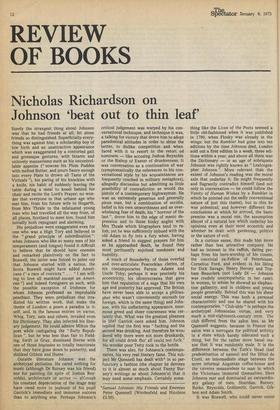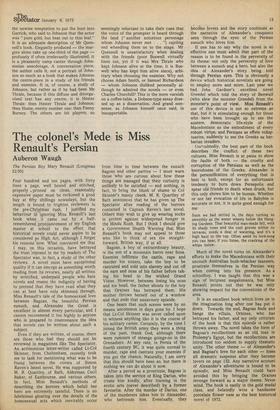REVIEW OF BOOKS
Nicholas Richardson on Johnson 'beat out to thin leaf'
Surely the strangest thing about Johnson was that he had friends at all, let alone friends so distinguished. Superficially everything was against him; a scholarship boy of low birth and an unattractive appearance which was exaggerated by a contorted gait and grotesque gestures, with bizarre and unlovely mannerisms such as his uncontrollable appetite (" sowces his Plum Pudden with melted Butter, and pours Sauce enough into every Plate to drown all Taste of the Victuals "), his paring of his knuckles with a knife, his habit of suddenly leaving the table during a meal to kneel behind his chair and recite the Lord's Prayer; no wonder that everyone in that urbane age who met him, from his future wife to Hogarth, from Mrs Thrale to the infatuated young man who had travelled all the way from, of all places, Scotland to meet him, found him initially both repugnant and alarming.
His prejudices were exaggerated even for one who was a High Tory and believed in the "grand principle of subordination ": when Johnson who like so many men of his temperament (and tongue) found it difficult to believe that he should have enemies and remarked plaintively on the fact to Boswell, the latter was forced to point out that Johnson started with a nation, the Scots. Boswell might have added Americans (" a race of convicts " . . . "I am willing to love all mankind except an American ") and indeed foreigners as such, with the possible exception of Irishmen for whom Johnson professed an improbable penchant. They were prejudices that irradiated his written work, that make the theme of London: a poem a paradox in itself, and, in the famous entries on excise, Whig, Tory, oats and others, invaded even his Dictionary. They also infected his literary judgement. He could admire Milton the poet while castigating the "Surly Republican ", but he was less than fair to Fielding, Swift or Gray, dismissed Sterne with one of those boutades so totally inaccurate that they have gone down to posterity, and disliked Gibbon and Hume.
Outside literature Johnson was the archetypal philistine. He cared nothing for music (although Dr Burney was his friend) nor for painting (in spite of Joshua Reynolds), architecture or acting — alt'aough his constant depreciation of the stage may have owed more to jealousy of his pupil Garrick's immediate and immense success than to anything else. Perhaps Johnson's critical judgement was warped by his conversational technique, and technique it was, a talking for victory that drove him to adopt paradoxical attitudes in order to shine the better, to dislike competition and when faced with it to resort to the retort ad hominem — like accusing Joshua Reynolds or the Bishop of Exeter of drunkenness. It was conversation as a continuation of war (symptomatically the references to his conversational style by his acquaintances are frequently couched in military metaphors), allegedly discussion but admitting as little possibility of contradiction as would the pistols of a contemporary highwayman. He was an extremely generous and generally pious man, but a combination of accidie, belief in his own unworthiness and an overwhelming fear of death, his " horrour of the last ", drove him to the edge of manic depression and to those kinky angles with Mrs Thrale which biographers tend to relish; yet he was sufficiently imbued with the old Adam to fly into a fury when, having asked a friend to suggest prayers for him as he approached death, he found they most pertinently enjoined meekness and humility.
A touch of Bounderby, of those overfed and over-articulate Peacockian clerics, of his contemporaries Parson Adams and Uncle Toby; perhaps it was precisely his eccentricity, his idiosyncrasies that gave him that reputation of a sage that his own age and posterity has approved. The British have never been able to accept a philosopher who wasn't conveniently uncouth (or foreign, which is the same thing) and Johnson, with his unflattering appearance, enormous greed and sheer coarseness was certainly that. What was the greatest pleasure in life? Garrick once asked him. Johnson replied that the first was "fucking and the second was drinking. And therefore he wondered why there were not more drunkards, for all could drink rho' all could not funk." No wonder poor Tetty took to the bottle.
There was also, for Johnson's contemporaries, his very real literary fame. This subject Mr Quennell has dealt with* in so perfunctory a fashion (the chapter he devotes to it is almost as much about Fanny Burney's writings as about Johnson's) that it may need some emphasis. Certainly some thing like the Lives of the Poets seemed a little old-fashioned when it was published in 1780, when Flosky was already in the wings: but the Rambler had gone into ten editions by the time Johnson died, London sold out a first edition in a week, three editions within a year, and above all there was the Dictionary — in an age of sobriquets Johnson was rightly known as "Lexicographer Johnson ". More relevant than the extent of Johnson's reading was the moral axis that underlay it. He might frequently and flagrantly contradict himself (and not only in conversation — he could follow the Vanity of Human Wishes by a Rambler in which he pointed out the sadly conventional nature of just this theme), but in this he was polemical; and however different the conclusions at which he arrived, the basic premise was a moral one, the assumption almost of a natural law which underlay his opinions even at their most eccentric and whether he dealt with gardening, politics or the nature of evil.
In a curious sense, this made him more rather than less attractive company. He had an interest in the raffish, dating perhaps from his hero-worship of his cousin, the convivial ex-Fellow of Peterhouse, Cornelius Ford, and evident in his liking for Dick Savage, Henry Hervey and Topham Beauclerk (not Lady Di — Johnson was crudely unsympathetic in her case); In women, to whom he showed an elephantine gallantry, and in children and young people generally. Behind this was his sheer social energy. This was both a personal characteristic and one he shared with his contemporaries. " Club-able " is perhaps the archetypal Johnsonian virtue, and very much a mid-eighteenth-century term. The club differed from the salon less, as Mr Quennell suggests, because in France the salon was a surrogate for political activity in a state which barely tolerated such a thing, but for the rather more banal rea son that it was resolutely male. It is the difference between the Turk's Head (sad predestination of names) and the Hotel de Conti, an intermediate stage between the more informal Augustan coffee-house and the caverns measureless to man in which the Victorians immured themselves. Here Johnson met and dominated an extraordin ary galaxy of men, Sheridan, Burney, Burke, Reynolds, Goldsmith, Garrick, Gibbon and Adam Smith.
It was Boswell, who could never resist the unwise temptation to put the boot into Garrick, who said to Johnson that the actor was "pure gold, but beat out to thin leaf." It is an adequate description of Mr Quennell's book. Elegantly produced — the margins alone take up one-third of the page — profusely if often irrelevantly illustrated, it is a pleasantly camp canter through Johnsonian anecdotage. A conversation piece, the author calls it, not a portrait of Johnson so much as a book that makes Johnson the centre-piece in a study of his friends and enemies. It is, of course, a study of Johnson, but rather as if he had been Mr Thrale, because if this diffuse and disorganised text 'has any centre, it is Hester Thrale: then Hester Thrale and Johnson: then Hume, enemy number one: then Fanny Burney. The others are bit players, so seemingly reluctant to take their cues that the voice of the prompter is heard through the land (" another notorious personage whom Johnson never met . . . ") cajoling and wheedling them on to the stage. Mr Quennell is unsatisfactory when dealing with the friends (poor Boswell virtually loses out, yet if it was Mrs Thrale who kept Johnson alive at the time, it is Boswell who has kept him alive since), arbitrary when choosing the enemies. Why not choose Adam Smith, or Samuel Richardson — whom Johnson disliked personally although he admired the novels — or even Charles Churchill? This is the mere varnish on a coffee-table, a Dobson-type essay dressed up as a dissertation. And grand nonsense, as Johnson himself once said, Is insupportable.


































 Previous page
Previous page